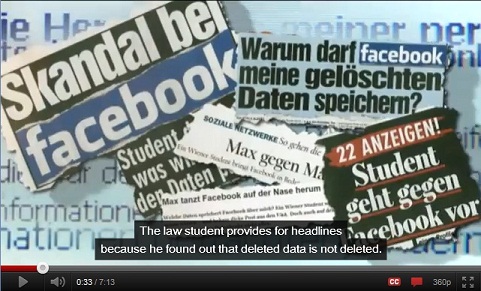In Europe there has been a lot of discussion about “the Right to be Forgotten” (see, for example, Le droit à l’oubli sur Internet). The notion is that after some time, information should simply fade away (counteracting digital eternity).
In America, the authors of the Social Network Users’ Bill of Rights have called their variant of this the “Right to Withdraw”.
Whatever words we use, the right, if recognized, would be a far-reaching game-changer – and as I wrote here, represent a “cure as important as the introduction of antibiotics was in the world of medicine”.
Against this backdrop, the following report by CIARAN GILES of the Associated Press gives us much to think about. It appears Google is fighting head-on against the “the Right to be Forgotten”. It seems to be willing to take on any individual or government who dares to challenge the immutable right of its database and algorithms to define you through something that has been written – forever, and whether it's true or not.
MADRID – Their ranks include a plastic surgeon, a prison guard and a high school principal. All are Spanish, but have little else in common except this: They want old Internet references about them that pop up in Google searches wiped away.
In a case that Google Inc. and privacy experts call a first of its kind, Spain's Data Protection Agency has ordered the search engine giant to remove links to material on about 90 people. The information was published years or even decades ago but is available to anyone via simple searches.
Scores of Spaniards lay claim to a “Right to be Forgotten” because public information once hard to get is now so easy to find on the Internet. Google has decided to challenge the orders and has appealed five cases so far this year to the National Court.
Some of the information is embarrassing, some seems downright banal. A few cases involve lawsuits that found life online through news reports, but whose dismissals were ignored by media and never appeared on the Internet. Others concern administrative decisions published in official regional gazettes.
In all cases, the plaintiffs petitioned the agency individually to get information about them taken down.
And while Spain is backing the individuals suing to get links taken down, experts say a victory for the plaintiffs could create a troubling precedent by restricting access to public information.
The issue isn't a new one for Google, whose search engine has become a widely used tool for learning about the backgrounds about potential mates, neighbors and co-workers. What it shows can affect romantic relationships, friendships and careers.
For that reason, Google regularly receives pleas asking that it remove links to embarrassing information from its search index or least ensure the material is buried in the back pages of its results. The company, based in Mountain View, Calif., almost always refuses in order to preserve the integrity of its index.
A final decision on Spain's case could take months or even years because appeals can be made to higher courts. Still, the ongoing fight in Spain is likely to gain more prominence because the European Commission this year is expected to craft controversial legislation to give people more power to delete personal information they previously posted online.
“This is just the beginning, this right to be forgotten, but it's going to be much more important in the future,” said Artemi Rallo, director of the Spanish Data Protection Agency. “Google is just 15 years old, the Internet is barely a generation old and they are beginning to detect problems that affect privacy. More and more people are going to see things on the Internet that they don't want to be there.”
Many details about the Spaniards taking on Google via the government are shrouded in secrecy to protect the privacy of the plaintiffs. But the case of plastic surgeon Hugo Guidotti vividly illustrates the debate.
In Google searches, the first link that pops up is his clinic, complete with pictures of a bare-breasted women and a muscular man as evidence of what plastic surgery can do for clients. But the second link takes readers to a 1991 story in Spain's leading El Pais newspaper about a woman who sued him for the equivalent of euro5 million for a breast job that she said went bad.
By the way, if it really is true that the nothing should ever interfere with the automated pronouncements of the search engine – even truth – does that mean robots have the right to pronounce any libel they want, even though we don't?


